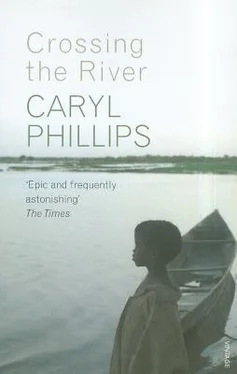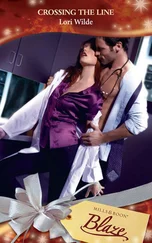Caryl Phillips - Crossing the River
Здесь есть возможность читать онлайн «Caryl Phillips - Crossing the River» весь текст электронной книги совершенно бесплатно (целиком полную версию без сокращений). В некоторых случаях можно слушать аудио, скачать через торрент в формате fb2 и присутствует краткое содержание. Год выпуска: 2006, Издательство: Vintage, Жанр: Современная проза, на английском языке. Описание произведения, (предисловие) а так же отзывы посетителей доступны на портале библиотеки ЛибКат.
- Название:Crossing the River
- Автор:
- Издательство:Vintage
- Жанр:
- Год:2006
- ISBN:нет данных
- Рейтинг книги:4 / 5. Голосов: 1
-
Избранное:Добавить в избранное
- Отзывы:
-
Ваша оценка:
- 80
- 1
- 2
- 3
- 4
- 5
Crossing the River: краткое содержание, описание и аннотация
Предлагаем к чтению аннотацию, описание, краткое содержание или предисловие (зависит от того, что написал сам автор книги «Crossing the River»). Если вы не нашли необходимую информацию о книге — напишите в комментариях, мы постараемся отыскать её.
Crossing the River — читать онлайн бесплатно полную книгу (весь текст) целиком
Ниже представлен текст книги, разбитый по страницам. Система сохранения места последней прочитанной страницы, позволяет с удобством читать онлайн бесплатно книгу «Crossing the River», без необходимости каждый раз заново искать на чём Вы остановились. Поставьте закладку, и сможете в любой момент перейти на страницу, на которой закончили чтение.
Интервал:
Закладка:
It seemed another age now, although in truth it was only two months ago that Lucy, her hair in a wrap, had come to her in the small, two-roomed cabin that they shared, and broken the news of her impending marriage. It had been a dark night, the solitary light from a candle teasing the two friends with the twin possibilities of both warmth and security. Not that Lucy’s news came as any surprise to Martha, for she had long been aware of her friend’s feelings for the colored man from the dry goods store. Tubs and boilers no longer had a hold on Lucy’s mind, and now she would be escaping them by marrying this man who had built himself a storey and a half house from the profits of selling that boom-town, sure-fire money-maker at a dollar a pound: nails. Martha took Lucy’s hands in her own, and told her that she was pleased, and that Lucy must not, under any circumstances, worry over her. With this said, she encouraged Lucy to begin packing if she was going to leave, as planned, in the morning. Lucy levered herself out of her chair and began to address herself to the tasks at hand, while an ailing Martha sat basking in the glow of the candle and watched her. These days, Martha’s old body was overburdened, and seldom did she pass an afternoon without a few cat-naps. By evening her feet and ankles were so swollen that she had to use both hands to pull off her shoes, and her undergarments now grew strangely tight during the days, her underskirt band often cutting into her waist. She desperately needed to rest, but she had determined that Lucy must never see the evidence of her malaise. And certainly not now. Lucy was to leave with a clear conscience, but not before Martha had herded her into the picture-making man’s studio and ordered her to sit still. She watched her friend as she continued to gather up her few belongings, and Martha began to laugh quietly to herself.
A week later, the man came into the cabin outhouse, his arms burdened down with a bundle of heavy flannel shirts and coarse pants that needed laundering. Such visits were becoming less common, for either men seemed to be getting accustomed to giving their own garments the soap and water treatment, or Martha had serious competition from some place that she had not, as yet, heard about. The conversation that he struck up with Martha was a generous one, in that he desired to know if she could possibly manage this load by herself. Well, excuse me, mister. Was there anybody else in town to whom he might turn? Feigning ignorance of what he might be implying, Martha took the clothes and assured him that they would be ready for him whenever he needed them. This was just as well, he said, for he would soon be leaving for California with a group of colored pioneers. He informed her of this fact as though it were something that one ought to be proud of, and with this announcement delivered, he tipped his hat and wished her good day. After he left, Martha thought long and hard about her own prospects. The many years of her life with Lucy in this two-roomed cabin were now at an end, and although this Leavenworth had suited her, despite its numerous saloons, billiard parlors, and houses of joy, Martha felt that she must leave. Not that Leavenworth was either violent or dangerous. In fact, the townsmen had established a liking for law and order, and introduced codes that were rigidly enforced by deputies and marshals, which meant that in this town the fast gun was not the law. But although Leavenworth was free of the turbulence of Dodge, and in spite of the fact that her years here had been peaceful, if somewhat lonely, Martha had a strange notion that she, too, must become a part of the colored exodus that was heading west. Lucy had left behind a letter, not so much inviting Martha to come out and join her and her future husband in San Francisco, but begging her to do so. Martha unfolded the square of paper and decided to look it over one more time. Then, when she had finished, she blew out the lamp and sat quietly in the dark. Eliza Mae was once again back in her mind, not that her lost child had ever truly vanished. Perhaps her girl-child had pioneered west?
When, some days later, the man returned for his clean and well-ironed garments, Martha eyeballed him directly and announced that she, too, would be coming along. She deliberately did not ask, but he, with equal deliberation, did not respond. So once again, Martha informed him of her decision, and only now did he put down the clothes and begin to explain why this would not be possible. He advised Martha that this was to be a long and difficult journey, with at least twenty wagons, and they would have to cope with what the Indians called ‘crazy weather’, both blizzards and heat. Martha simply stared back at the man, forcing him to continue. ‘We’ll be following stream beds most of the way, but you never know.’ He shrugged his shoulders. ‘And we’ll likely be called upon to walk, for the wagons will use every ounce of space for food, water, tools, and so on.’ Martha found herself borrowing courage from this conversation, the way she had seen some men do from tequila. ‘My role will be to cook for you,’ she said. ‘I won’t be a burden, but I don’t have no savings.’ She went on, assuring him that she knew about wild and dangerous country, and had many times seen horses and oxen shot that had broken their legs, and watched as the trailriders made soup out of their hides and bones. She claimed that she had been aboard wagons that had fallen clean apart, that she knew sagebrush and sidewinders like they were her kin, and the shifting sands and whirling dust of the cactus-shrouded world would suit her just dandy. ‘I’m afraid of nothing,’ said Martha, ‘least of all Indians or hard times. Colored folks generally got to be obligated to white folks to get clear to California, but you colored pioneers are offering me a chance. You let me work my fare out and I’ll cook, wash clothes, and powerfully nurse to the sick and ailing. And I ain’t fussy about sleeping on no bare ground. I done it plenty of times before, had the beaten hardness of the earth for a bed and the sky for covering.’ The man looked blankly at her, but Martha, anxious that she should not be fooled, pressed on and asked after him when they proposed leaving. ‘The day after tomorrow,’ he said, his voice low, his expression now one of confusion. ‘I’ll be ready,’ said Martha, tearing at her apron. ‘And you just tell your people that you done found a cook.’ He smiled weakly, then turned and left, his arms laden with clean laundry. My daughter. The energy of youth once more stirred within her. I know I’m going to find my child in California.
But the woman who now stood above Martha, casting pitiful glances, was not her daughter. Eliza Mae? ‘I’ll leave you now,’ she said. ‘But you must expect to receive me in the morning.’ You must expect to receive me? Did she mean by this to suggest that Martha had some choice over their arrangement? That she could, if she so wished, choose not to receive her in the morning? Martha watched the woman back slowly out of the cold room. Thank you. She left Martha alone. Sickness had descended upon her and she was unable to respond. Martha felt the sadness of not possessing a faith that could reassure her that, having served her apportioned span, she would now be ushered to a place of reunion. She looked through the cracked window-pane. Dawn was some hours off, back east, approaching slowly. To be reunited. The town of Denver was mantled in a deep snow, the arms of the trees sheathed in a thin frost, the same thin frost that enveloped Martha’s faithless heart.
The evening sky is streaked with red and yellow. I watch as the sun prepares to go down beneath the horizon. To my left, there is panic. Voices begin to climb. A pioneer has broken an ox by driving it too hard. It has to be slaughtered, but at least there will be fresh meat. He ignores this commotion and stands before me with frustration written across his face. I know that I have slowed down their progress. It is this that he wishes to talk with me about. He rolls a cigarette, his fingers clammy and stiff, and then he gestures me to rest upon the hide-bottom chair. He is a man who speaks as much with his hands as his voice. I had noticed this when he first came in with his bundle of flannel shirts and coarse pants. ‘Well?’ This is his beginning. I know what will follow. I look beyond him. A storm is working its way across the land. My old ears can still hear the dull rumbling of thunder.
Читать дальшеИнтервал:
Закладка:
Похожие книги на «Crossing the River»
Представляем Вашему вниманию похожие книги на «Crossing the River» списком для выбора. Мы отобрали схожую по названию и смыслу литературу в надежде предоставить читателям больше вариантов отыскать новые, интересные, ещё непрочитанные произведения.
Обсуждение, отзывы о книге «Crossing the River» и просто собственные мнения читателей. Оставьте ваши комментарии, напишите, что Вы думаете о произведении, его смысле или главных героях. Укажите что конкретно понравилось, а что нет, и почему Вы так считаете.












